Mobile CPU Wars: Core 2 Duo vs. Core Duo
by Anand Lal Shimpi on August 3, 2006 9:25 AM EST- Posted in
- CPUs
The Test Platform
For today's review we compared Intel's Core 2 Duo T7600 (2.33GHz/4MB) to Intel's Core Duo T2600 (2.33GHz/2MB). The apples-to-apples comparison starts with two CPUs with identical clock speeds, but is further reinforced by the test platform: a Napa based ASUS notebook.
The ASUS Z96Js is outfitted with a 15.4" widescreen display with a 1280 x 800 native resolution, driven by a 256MB ATI Mobility Radeon X1600. Our test system was outfitted with two 512MB DDR2-667 memory modules. Unfortunately the ASUS notebook doesn't allow adjustment of memory timings so they were left at the SPD defaults of 5-5-5-15. We installed a 7200RPM Hitachi Travelstar 7K100 (60GB SATA) hard drive in the notebook, but regardless of what we use, 2.5" disk speeds are still nowhere near what's available on today's 3.5" desktop drives.
The motherboard in the Z96Js features Intel's 945PM chipset and a 479-pin Socket-M interface. Since both of our test CPUs were Socket-M processors, all we had to do was get a BIOS update to support Merom and swap the CPUs to compare the two.
Swapping CPUs is easy in the Z96Js, you get access to the memory slots and CPU socket by removing one panel on the bottom of the motherboard (as shown above). The next step is to remove the heatsink which is shared between the CPU and GPU; there are seven screws that have to be removed and ASUS kindly labels the order you should remove them to avoid cracking your CPU's exposed core:
With the heatsink removed, we can take a look at the CPU and GPU:
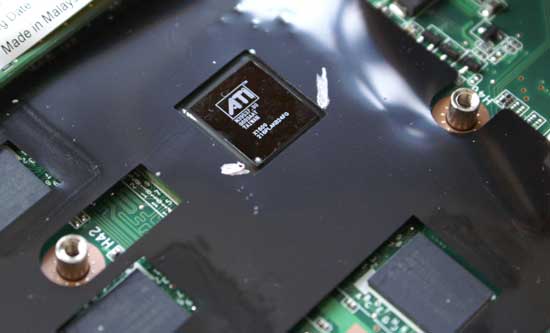
To release the CPU all you need is a small flat head screwdriver to unlock the socket:
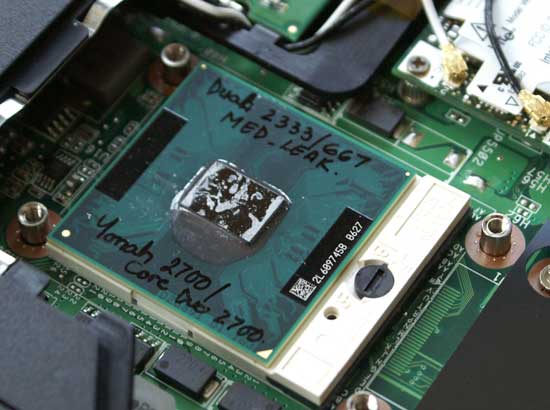
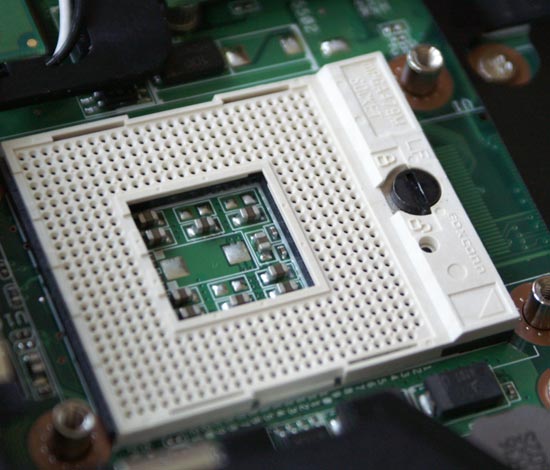
Today's article is a direct comparison between Intel's Core Duo and Core 2 Duo, since we're using the exact same platform for both. We just recently received MSI's Turion 64 X2 notebook in house and will be working on a separate review of it for those of you curious about the new Turion 64 X2 CPUs. But today we're here to find out how much faster Core 2 Duo is than Core Duo in notebooks, and if we can expect battery life to change for better or worse.


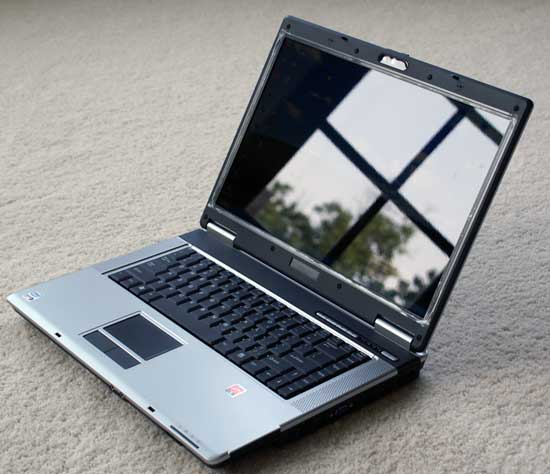

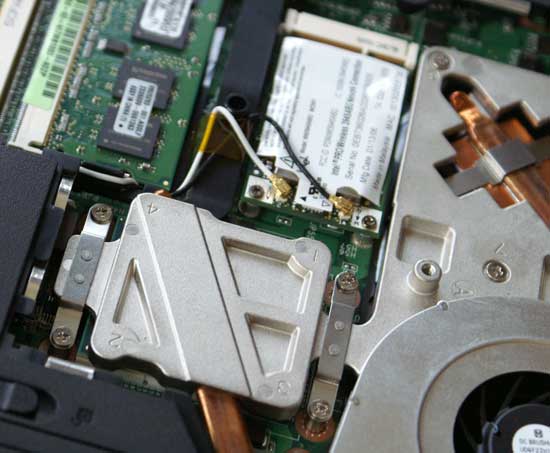
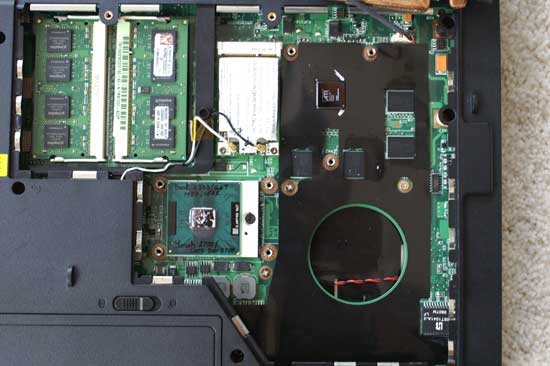








46 Comments
View All Comments
Sergio710 - Thursday, August 3, 2006 - link
I've heard that Merom would come to 45 nm some day, does anyone know more about it ?supposed date ?
impact on battery life ?
mino - Thursday, August 3, 2006 - link
All CPU series wiil go 45nm. Eventually.AFAIK don't expect 45nm Core 2's sooner that Q108.
Sergio710 - Thursday, August 3, 2006 - link
Forgive my ignorance, but what benefit will have 64 bits for every day use ?better performances on Vista or enabled soiftware or only the possibility to install more RAM ?
LoneWolf15 - Friday, August 4, 2006 - link
Longevity will be the benefit.It's not helpful right now, but if you're like me, you'd keep a notebook computer for some time before getting rid of it. I buy as future-proof (since that isn't possible, future-resistant) as I can. That means I'd want a 64-bit capable processor so that I can run the 64-bit version of Vista at some point, and so that I have the option of going to 4GB of RAM on my notebook some day. Since Merom prices are the equivalent of Yonah prices, this makes even more sense --it wouldn't cost me any more.
Pandaren - Thursday, August 3, 2006 - link
Right now, there is no benefit. Unless you are running Linux. 64-bit is completely useless for most people until Microsoft gets it together and finishes Windows Vista.peternelson - Thursday, August 3, 2006 - link
I agree I was thinking of 64 bit linux and technical apps like rendering.However there is possible option on XP64 professional. eg if you want to do trial factoring for mersenne.org prime number project, running the 64 bit client gives a big boost over 32 bit version.
I hope 64 bit becomes more mainstream (not just nerds) when Vista 64 is available.
In ideal world: boot linux64 and Vista64 or virtualise one with the other.
As a bonus if you can throw in a 64 bit version of a new Mac OS for a triple OS environment, that would be just what the doctor ordered.
At the moment I can live without the Apple support, so linux/vista will be fine. ie Linux for serious work, Vista for 3D gaming.
jeffwegher - Thursday, August 3, 2006 - link
Isn't another advantage of the new Merom that it's 64-bit whereas the older Yonah is only 32-bit?peternelson - Thursday, August 3, 2006 - link
He stole my comment, but ABSOLUTELY.A major disadvantage of Core Solo and Duo (as in Yonah) was that it's 32 bit ONLY.
For that reason I won't buy a laptop or apple mac based around it.
Merom (Core 2 Duo) IS 64 bit capable and that's important to me. It's the MOST important feature of this upgrade, second most important is virtualisation.
I hope Apple wake up and start sticking Meroms into their desktop and notebook macs real soon.
Also anandtech you don't mention that very point, using a so-called mobile cpu in a desktop SFF which is a market predicted to grow.
This has to be another big market for Merom cpu: space saving home systems, media centres etc.
As for all the hype about how much better this new generation architecture is, I have to say the performance jump of 2-5-10-15-20% is mediocre compared to what might have been expected if the reality lived up to the hype. Thanks anandtech for setting the record straight. On the other hand ANY performance increase for no extra battery usage has to be welcome. You're right that the FSB constraint limits it in today's machines.
It's good they are priced similarly although in the market I expect manufacturers to charge a premium in the short term.
How quickly will Apple be adopting this in their small desktop machines?
IntelUser2000 - Saturday, August 5, 2006 - link
Actually you are in your own reality to expect greater advantage than that over Core Duo. If you have been actually paying attention, Intel expects 20% advantage for Core 2 Duo 2.33GHz over Core Duo 2.167GHz. Core 2 Duo's performance advantage of 40% applies against Pentium D, which is worse performer than Core Duo.
Not to mention Core 2 Duo in Laptop has same FSB, same memory, same chipset as Core Duo!!
Pandaren - Thursday, August 3, 2006 - link
Intel claimed all along a 40% performance jump relative to Pentium D, NOT Core Duo. The performance jump relative to Core Duo was always claimed as "up to 20%," which is in line with Anandtech's findings.